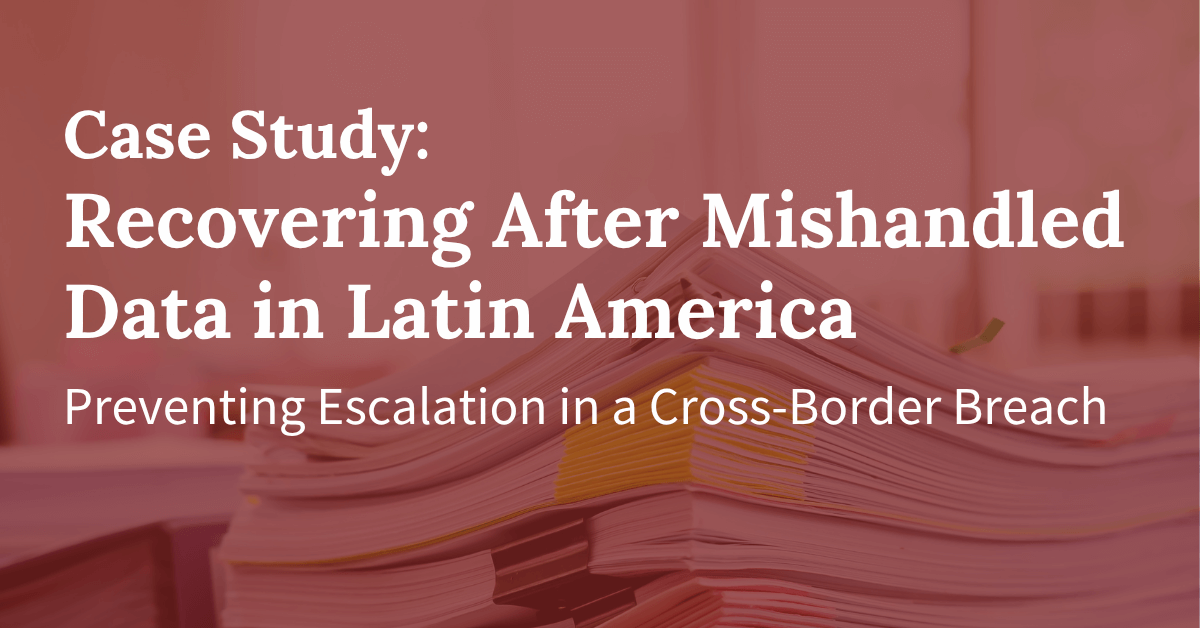
A frontline employee quit without warning and walked out with a box of paper files containing sensitive client data. No formal termination. No exit interview. No explanation. Just an empty desk and missing records that weren't digitized, weren't tracked, and weren't supposed to leave the building.
For an organization operating across borders with stakeholders thousands of miles away, the discovery triggered immediate alarm. Client trust was at risk. Regulatory exposure was unclear. And stakeholders based in the United States—operating under different legal frameworks and cultural expectations—began demanding answers, accountability, and in some cases, resignations.
The organization hadn't committed fraud. There was no malicious intent. But procedural negligence in one jurisdiction had created a crisis of confidence in another. Without swift action, the incident could spiral into stakeholder withdrawal, donor scrutiny, and lasting reputational damage that would outlive the facts.
The client called Pholus for immediate containment. What followed was a discreet recovery operation, stakeholder panic management, and a complete overhaul of data handling protocols—all executed without public disclosure, legal complaints, or internal resignations.
This case study is relevant if you're facing:
Physical data security breaches in markets where digitization is incomplete and paper records still form the backbone of client documentation, regulatory compliance, or operational continuity. A departed employee has taken materials with them, and you're uncertain about exposure, legal obligations, or how to recover records without escalating the situation.
Cross-border stakeholder panic triggered by incidents that feel larger from a distance than they are on the ground. Your funders, board members, or institutional partners are operating under different legal frameworks and cultural expectations, and their alarm is driving demands for terminations, external audits, or public accountability that may not match the reality of what occurred.
Unclear regulatory exposure in jurisdictions where data protection laws exist but enforcement is inconsistent, interpretation varies, and the gap between formal requirements and practical norms creates confusion about what your actual obligations are. You need to assess real risk, not worst-case legal theory.
The need to recover sensitive materials discreetly without triggering retaliation, public disclosure, or escalation that could damage client relationships, attract regulatory attention, or create new problems larger than the original breach. You need someone who understands how to navigate informal recovery processes in complex jurisdictions.
Systemic gaps in data handling, offboarding procedures, or record custody protocols that this incident has exposed, and you need to implement reforms quickly to restore stakeholder confidence while avoiding the appearance of systemic negligence or ethical failure. You're rebuilding trust while under scrutiny.
Pholus was retained immediately after the incident was discovered. Our mandate was threefold: recover the physical records, contain stakeholder panic, and implement systemic safeguards to prevent recurrence.
We initiated a quiet protocol to retrieve the paper records. Our team coordinated with local legal counsel in the employee's jurisdiction to understand what recovery options existed without triggering formal litigation or public proceedings. We made respectful, non-threatening contact with the former employee through appropriate channels and recovered 100% of the records without escalation or public disclosure. There was no evidence of malicious intent, only procedural negligence and a poorly managed offboarding process that allowed materials to leave without oversight.
We delivered a neutral, factual briefing to U.S.-based stakeholders who were alarmed and demanding immediate action. Initial calls included demands for internal resignations and concerns about breach of client trust, legal exposure under foreign data regulations, and unclear chain of custody for client records. We reframed the event as a preventable operational oversight, not an ethical breach or systemic failure. We provided a templated internal communication to avoid blame-laden narratives, suggested talking points for funder conversations, and delivered a timeline of containment efforts to reassure all parties involved. The stakeholders accepted the explanation and stood down. No resignations occurred.
We led immediate reforms to prevent future exposure. The event served as a wake-up call, and Pholus was retained to guide systemic improvements. We helped the organization transition core customer records to secure digital formats, created a formal paper handling policy with audit trails, required exit interviews and checklist protocols for departing staff, installed localized file storage safeguards with offsite redundancies, and drafted internal guidance on cross-border incident communication when stakeholders operate in a different legal and cultural environment. These changes were implemented within 30 days and presented to stakeholders as evidence of organizational learning and accountability.
We bridged the gap between operational reality and stakeholder perception. In fragile environments, the smallest operational lapse can cause disproportionate stakeholder fear, especially when those stakeholders sit thousands of miles away and operate under different assumptions about risk, enforcement, and appropriate response. We prevented overreaction, guided recovery, and left stronger systems behind without allowing distance to distort the response.
This case study includes the complete recovery approach we used to retrieve sensitive materials without escalation or public exposure, the communication framework that stabilized cross-border stakeholder relationships during a high-pressure period, and the implementation timeline for systemic safeguards that restored institutional confidence while the organization remained under scrutiny.
If your organization has experienced a data security incident, physical record breach, or cross-border stakeholder crisis triggered by operational gaps, we can help. Pholus specializes in discreet recovery operations, stakeholder panic management, and systemic reforms that restore confidence without triggering legal escalation, public exposure, or unnecessary internal consequences.
Whether you're navigating physical data breaches in markets where digitization is incomplete, managing stakeholder alarm from thousands of miles away, or need to implement safeguards quickly while under scrutiny, we provide the clarity and coordination you need to contain the situation and rebuild trust.